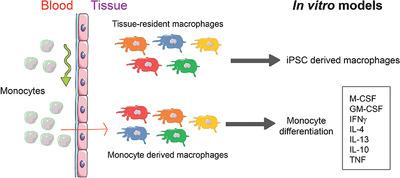当前位置:
X-MOL 学术
›
J. Leukoc. Biol.
›
论文详情
Our official English website, www.x-mol.net, welcomes your
feedback! (Note: you will need to create a separate account there.)
Classic and new mediators for in vitro modelling of human macrophages
Journal of Leukocyte Biology ( IF 3.6 ) Pub Date : 2020-06-27 , DOI: 10.1002/jlb.1ru0620-018r Rosario Luque-Martin 1 , Palwinder K Mander 2 , Pieter J M Leenen 3 , Menno P J Winther 1, 4
Journal of Leukocyte Biology ( IF 3.6 ) Pub Date : 2020-06-27 , DOI: 10.1002/jlb.1ru0620-018r Rosario Luque-Martin 1 , Palwinder K Mander 2 , Pieter J M Leenen 3 , Menno P J Winther 1, 4
Affiliation

|
Macrophages are key immune cells in the activation and regulation of immune responses. These cells are present in all tissues under homeostatic conditions and in many disease settings. Macrophages can exhibit a wide range of phenotypes depending on local and systemic cues that drive the differentiation and activation process. Macrophage heterogeneity is also defined by their ontogeny. Tissue macrophages can either derive from circulating blood monocytes or are seeded as tissue‐resident macrophages during embryonic development. In humans, the study of in vivo‐generated macrophages is often difficult with laborious and cell‐changing isolation procedures. Therefore, translatable, reproducible, and robust in vitro models for human macrophages in health and disease are necessary. Most of the methods for studying monocyte‐derived macrophages are based on the use of limited factors to differentiate the monocytes into macrophages. Current knowledge shows that the in vivo situation is more complex, and a wide range of molecules in the tissue microenvironment promote and impact on monocyte to macrophage differentiation as well as activation. In this review, macrophage heterogeneity is discussed and the human in vitro models that can be applied for research, especially for monocyte‐derived macrophages. We also focus on new molecules (IL‐34, platelet factor 4, etc.) used to generate macrophages expressing different phenotypes.
中文翻译:

用于人类巨噬细胞体外建模的经典和新介体
巨噬细胞是激活和调节免疫应答的关键免疫细胞。这些细胞在稳态条件下和许多疾病环境中存在于所有组织中。巨噬细胞可表现出广泛的表型,具体取决于驱动分化和激活过程的局部和全身性提示。巨噬细胞的异质性也由它们的个体发育来定义。组织巨噬细胞可以来源于循环血液单核细胞,也可以在胚胎发育过程中以组织驻留巨噬细胞的形式播种。在人类中,体内研究费力且细胞不断变化的分离程序通常难以产生巨噬细胞。因此,对于健康和疾病中的人类巨噬细胞而言,需要可翻译,可复制且健壮的体外模型。大多数研究单核细胞衍生的巨噬细胞的方法都是基于使用有限的因素将单核细胞分化为巨噬细胞的。当前的知识表明,体内情况更为复杂,组织微环境中的多种分子促进并影响单核细胞向巨噬细胞的分化以及活化。在这篇综述中,讨论了巨噬细胞异质性和人类体外可用于研究的模型,尤其是单核细胞衍生的巨噬细胞。我们还将重点研究用于生成表达不同表型的巨噬细胞的新分子(IL-34,血小板因子4等)。
更新日期:2020-06-27
中文翻译:

用于人类巨噬细胞体外建模的经典和新介体
巨噬细胞是激活和调节免疫应答的关键免疫细胞。这些细胞在稳态条件下和许多疾病环境中存在于所有组织中。巨噬细胞可表现出广泛的表型,具体取决于驱动分化和激活过程的局部和全身性提示。巨噬细胞的异质性也由它们的个体发育来定义。组织巨噬细胞可以来源于循环血液单核细胞,也可以在胚胎发育过程中以组织驻留巨噬细胞的形式播种。在人类中,体内研究费力且细胞不断变化的分离程序通常难以产生巨噬细胞。因此,对于健康和疾病中的人类巨噬细胞而言,需要可翻译,可复制且健壮的体外模型。大多数研究单核细胞衍生的巨噬细胞的方法都是基于使用有限的因素将单核细胞分化为巨噬细胞的。当前的知识表明,体内情况更为复杂,组织微环境中的多种分子促进并影响单核细胞向巨噬细胞的分化以及活化。在这篇综述中,讨论了巨噬细胞异质性和人类体外可用于研究的模型,尤其是单核细胞衍生的巨噬细胞。我们还将重点研究用于生成表达不同表型的巨噬细胞的新分子(IL-34,血小板因子4等)。











































 京公网安备 11010802027423号
京公网安备 11010802027423号